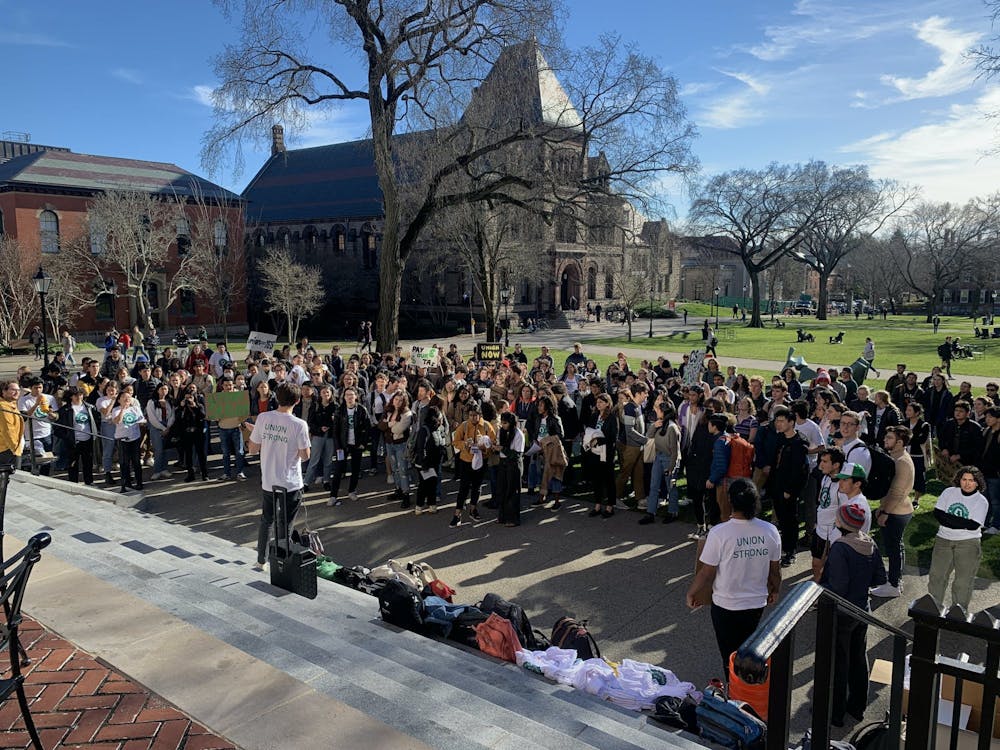The Teaching Assistant Labor Organization, a proposed union of undergraduate computer science teaching assistants, has reached a stipulated election agreement with the University to hold a workplace election Thursday, March 2. The election will be held from 12-3 p.m. and 5-8 p.m. via a secret-ballot process at a location that has yet to be determined, according to the signed agreement, which The Herald reviewed.
TALO and the University agreed that all undergraduate, meta and head computer science teaching assistants who worked during the fall 2022 semester or are currently working during the spring 2023 semester are eligible to vote in the election. If the majority vote yes, the CS TAs will be represented by the Graduate Labor Organization in collective bargaining negotiations with the University.
A group of CS TA organizers launched their campaign to unionize last December in order to negotiate with the University on TA wages, hours and responsibilities following complaints of overwork and other difficulties, The Herald previously reported.
TALO filed its official petition — which proposed eligible members of the bargaining unit and details regarding the administration of the election — with the National Labor Relations Board on Jan. 11 after the University initially declined its request for voluntary recognition in December.
At filing, TALO received authorization cards from over 70% of TAs who worked during the fall semester and over 50% of TAs who are working for the current semester, according to Colton Rusch ’23, a TALO organizer.
After the petition was filed, the University was given a Jan. 25 deadline to submit a statement outlining its stance on TALO’s proposals for the workplace election — such as the bargaining unit definition and election date. TALO would then have to respond with its own position statement, after which both parties were expected to attend a hearing Feb. 2 to begin the process of reconciling any differences between their respective statements.
But the University never filed its statement of position and instead TALO and University lawyers negotiated an election agreement, Rusch said. The agreement, signed Feb. 1, lays out all workplace election details and allows the parties to forgo the NLRB hearing and reconciliation process.
Since the University did not “object to the proposed bargaining unit or holding (of) an election, the NLRB representative handling the election petition (worked) with the parties to agree to the terms of when and where the election will be held,” wrote University Spokesperson Brian Clark in an email to The Herald. “Both the union and the University were represented by counsel in these discussions with the NLRB's Boston office, and the election is now scheduled.”
“We are eager to get to work on negotiating a contract to implement the necessary changes to make Brown's CS UTA program the standard-bearer for undergraduate computer science education,” Rusch wrote in a message to The Herald. “Unions are ultimately about building democracy in the workplace, and we look forward to seeing democracy in action at the ballot box on March 2.”
The University believes “all students who would be impacted by the formation of a union and a collective bargaining agreement should have an opportunity to directly exercise their vote in favor of or in opposition to unionization,” Clark wrote.
If eligible CS TAs “ultimately vote to form a union, we will respect that choice and enter into negotiations toward a collective bargaining unit,” he added. “Whether they vote in favor of a union or not, the University is committed to working in good faith to address their concerns.”
For now, TALO will focus on engaging with current TAs to ensure that “everyone’s experiences are heard” and that all TAs have the chance to join TALO, said Ronnie Shashoua ’25, a TALO organizer, in an interview with The Herald before the signing of the stipulated election agreement.
TALO organizers want to “take the chance to talk to everyone that is a TA to really understand their perspective and what they would want out of this body that would be representing them,” said Eva Lau ’23, another TALO organizer, in an interview before the agreement was signed.
The University believes that students “should be well-informed about what unionization entails — including the anticipated amount of student dues that will be deducted from their hourly pay, how dues will be expended and how decisions will be made about those dues and other union matters,” Clark wrote. “We have urged union organizers to provide information to eligible voters before an election is held, and the University will communicate accurately and factually with eligible voters as well.”
On Instagram, TALO has launched a TA Spotlight series in which TALO organizers and union members are invited to share their reasons for supporting the formation of a union, according to Julia McCauley ’23, a TALO organizer.
“Unionizing is a tangible way we can improve the CS TA program and leave it better than we found it,” McCauley shared in her TA Spotlight post. “The current operation of the program is unsustainable and we need formal and accountable representation to protect TAs and student learning.”
McCauley said that TALO will also continue to host events like the rally it held last December and general body meetings for all TAs to attend. TALO has also created a form for CS alumni and affiliates — people in some way connected to the department, such as retired professors — to sign on and express support.
McCauley said that several alumni who were former CS TAs have reached out to TALO and shared that they experienced the same issues TALO is currently working to resolve. These alumni are “excited by the changes that we are trying to make and just really want to express their support,” she added.

Sam Levine is a University News editor from Brooklyn, New York covering on-campus activism. He is a senior concentrating in International and Public Affairs.





